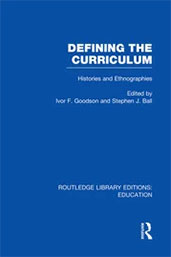Defining the Curriculum: histories and ethnographies
Subjects for Study: towards a social history of curriculum
Testing Hypotheses
In the three sections of the book noted above three main hypotheses are examined within the context of the history of three subjects involved in the conflict over environmental studies:
- 1 'That subjects are not monolithic entities but shifting amalgamations of sub-groups and traditions. These groups within the subject influence and change boundaries and priorities’ (see Bucher and Strauss 1971; Musgrove, 1968; Young, 1971, Kuhn, 1970 and 1972);
- 2 'That in the process of establishing a school subject (and associated university discipline) base subject groups tend to move from promoting pedagogic and utilitarian traditions towards the academic tradition' (see Layton, 1972; Ben-David and Collins, 1966);
- 3 'That in the conflict over environmental studies much of the curriculum debate can be interpreted in terms of conflict between subjects over status, resources and territory' (see Ben-David and Collins, 1966; Musgrove, 1968; Young, 1971).
1. Obviously this pattern would appear most strongly in subjects representing 'fields' rather than 'forms' of knowledge. The history of geography, for instance, shows that in the early stages the subject was made up of a variety of idiosyncratic local versions devised or taught by specialists from other disciplines. During the period in curriculum history that is the concern of the book, the battle over environmental education in the late sixties and early seventies; the sub-groups within geography can be seen 'pursuing different objectives in different manners' (Bucher and Strauss, in Hammersley and Woods, 1976, p. 19). So much so that in 1970 Professor Fisher wrote, 'The light-hearted prophecy I made in 1959 that we might soon expect to see the full 57 varieties of geography that have seriously been put forward in professional literature now stands at well over half that number' (Fisher, 1970, pp. 373-4). At about the same time, the President of the Geographical Association was warning that 'new' geography created a problem because 'it leads towards subject fragmentation', so that ultimately 'the question must arise as to how much longer the subject can effectively be held together' (Garnett, 1969, pp. 368-9). The potential danger of new versions of geography was touched on by Walford who argued that 'unity within the subject' was 'a basic requirement for its continued existence' (Walford, 1973, p. 97).
